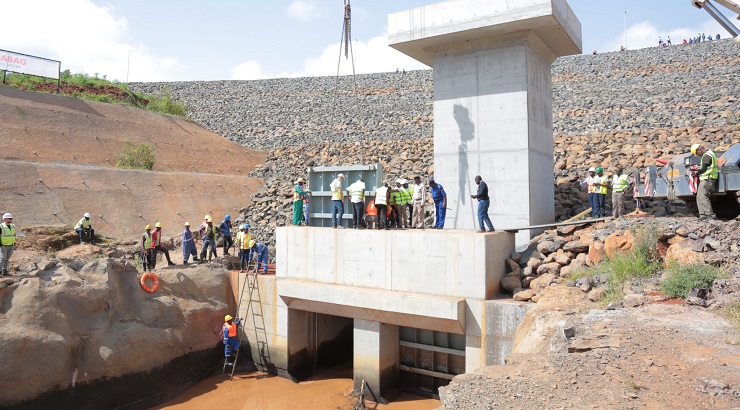
The much-awaited impounding of water in Thiba Dam is finally underway following the completion of the multi-billion-shilling dam in Kirinyaga County.
The filling up or impounding process of the dam officially began on Tuesday with the initial phase of impoundment expected to continue for five to eight days.
According Gitonga Mugambi, the CEO of the National Irrigation Authority, the lowering of Thiba Dam gate outlet to mark the official commencement of water impounding at the dam is a major milestone for the project.
“It is a big day for us as an institution…We are here today to lower the gate so that we start impounding of the water,” Mr Mugambi said.
German firm Strabag International GmbH managed to build the dam within the allocated timelines despite major challenges that threatened to delay the project.
Gate valve
Fitting water draw-off and safe floodwater drainage, for example, would have been completed by Dec. 2021 were it not for the late arrival from Germany of a gate valve for control of the water back to the river.
“We had a logistical problem in importing and clearing the equipment from the port. Luckily, the issue has been sorted and the valve will reach us in the next two weeks,” project engineer Stephen Mutinda said in March.
The 40-metre high; one-kilometre-long Thiba Dam project was partly financed by Japan through the Japan International Cooperation Agency (JICA).
Under the agreement, JICA provided Sh8 billion for the project.
The National Irrigation Board supervised Thiba Dam construction with a joint venture of Nippon Koei and Gibb Africa working as the project consultant.
The project was launched in Nov. 2017, but works kicked off in March 2018.
Payment default
The project was abruptly stopped in Oct. 2019 after Strabag ran out of funds following payment default by the government, resulting in the loss of 600 jobs.
In January 2020, work resumed after the State released Sh600 million for the project. Strabag, which was expecting Sh1 billion, recalled 300 workers.
The financial issues were later resolved.
Thiba Dam is designed with a capacity to hold 15 million cubic metres of water with a spillway to adjust water flow during rainy seasons to prevent flooding.
It is expected to double Mwea Irrigation Scheme’s rice production from 140,000 tonnes to 280,000 tonnes. Mwea produces 80% of the rice consumed in Kenya.
